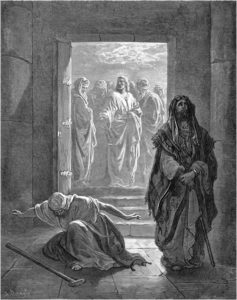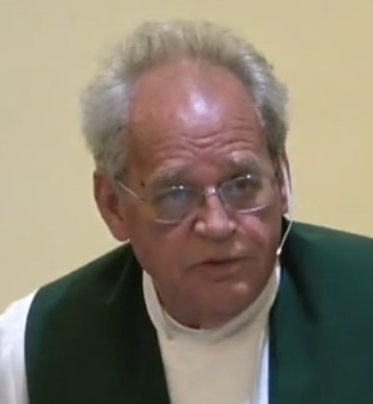Co-missioners,
This past Sunday, July 31, was the final day of pastoral service for Jerry Burce, our distinguished chief editor here at Thursday Theology. He enters retirement this week at the end of a long and fruitful career as a parish pastor, the last twenty-eight years of which were spent at Messiah Lutheran Church in Fairview Park, Ohio. Jerry is a preacher par excellence, and in honor of his retirement we’re using this week’s post to share the last Reformation Day sermon of his working life, from October 2021. In it, using his trademark down-to-earth language, he gets to the heart of a topic sure to be of interest to many of our readers: the very purpose of preachers and preaching.
Peace and Joy,
The Crossings Community
__________________________________________________________________
What Preachers are For (A Final Reformation Sermon)
By Jerome Burce
Grace to you and peace from God our Father and from our Lord and Savior, Jesus Christ.
I hear the clock ticking this morning. This is the last Reformation Day that I’ll spend with you as a pastor of this congregation. Soon it will be the last Christmas, the last Easter, the last Ascension Day, the last Pentecost. For Lutherans like us, these are the days of joy, the ones that drive us more than any other to the heart of who we are—of who we get to be—in Christ Jesus our Lord.
I get this year to take my last best shot at helping you taste this joy. That’s my goal, beginning today. Though I’d like to think it’s been my goal through all my years at Messiah. It certainly should have been. I was trained, after all, as a Lutheran preacher. That means I was trained to pass along what Martin Luther tumbled to 500 years ago, and not just Luther, but a lot of others with him. What they tumbled to was the utter astonishment of the Gospel—the breathtaking news of what God has done for us in Christ Jesus and is still doing for us this very day. And in tumbling to this they also tumbled to the real reason for pulpits, and for the preachers God puts in them. They’re not up there to entertain people, as if people could ever be entertained by a sermon. (Try telling that one to a squirming six-year-old.) More to the point, they’re also not up there to give you lessons from the Bible in how to pull up your socks and do what you’re supposed to to make God happy. That was standard fare in the sermons Luther listened to when he was growing up, and no one has ever tried harder than he did to pull those socks up and make God happy. Turns out he was cursed with an extra deep dose of personal honesty. It forced him to face what most other people, both then and now, refuse to admit. There’s no way that I, on my own, can make God happy. Pretend as I might, there is absolutely no way that I can ever get my own socks as perfectly adjusted as God expects them to be. And what’s true of me is most certainly true of you. It’s as St. Paul says this morning: “All have sinned and fallen short of the glory of God.” There’s not a one of us who’s fit for the garbage detail in heaven let alone for a seat in the banquet hall.
Now a lot of people these days will call that extreme. That includes a lot of baptized people, especially the ones who have managed to “make something of themselves” as people say. At some point you notice how the people you live and work with seem to respect you, admire you, even. After that it doesn’t take long to start admiring yourself—we’ve all been programmed from birth to do just that whenever we can—and from there it’s a short step to wondering why God wouldn’t have the good taste to admire you too. Only he doesn’t. Our Lord Jesus made that plain when he told the story of the Pharisee in the temple. The fellow pours out his account of how good he is in comparison with that wretch of a tax-collector. He expects God to clap his hands. God frowns instead.
It’s this frown on God’s face that Luther had the dreadful honesty to anticipate. And it’s why careful Lutheran preachers go out of their way not to turn their sermons into holy to-do lists: six steps to this, seven steps to the other—that sort of thing. It’s like begging people to make God frown as they pull out the list and start checking off the boxes—done, done, done. “Your turn, God, to pat me on the back.” What they’re sure to get instead is a foot in the back. God opposes the proud, as it says in the Letter of James. In any case, if you’re into holy checklists, he’s already given you one. It’s called the Ten Commandments. Try completing that. In practice it turns out to be a holy list of all the ways we disappoint God. Then, as icing on an already bitter cake, God tells us to love him with all our heart and soul and strength and mind, and to keep this up even as he pushes, pushes, pushes home the point of how disappointing we really are, not some of us, but all of us. Really, who can love this God if that’s the only way we get to know him, with his finger in our chest. Luther tried. He couldn’t do it. Instead he learned what St. Paul also said this morning: “Through the Law comes the knowledge of sin”—the terrible realization that you’re not good enough for God and never can be. And if that sounds harsh, just remember that there’s not a one of us—I don’t care who you are—who doesn’t have some fellow human beings out there with bones of one sort or another to pick with us —and this they do, usually out of earshot, behind our backs. We’re not good enough to meet even their low standards, let alone the standards that God holds us too. Think about that one.
+ + +
Comes then the astonishment. Or, as I heard someone else put it once, the “but. The big but. It’s the one St. Paul uses the minute he’s done describing the pickle we’re caught in. “But now”—“but now the righteousness of God has been disclosed, the righteousness of God through faith in Jesus Christ for all who believe. They are now justified—straightened out, made right in God’s eyes—by God’s grace as a gift, through the price Christ Jesus paid for them at the cost of his life.”
Now this is one thick sentence. It takes a lifetime to digest, and even then there is so much more to be gotten from it than we ever manage to get.
Here’s a simple way to put it. God isn’t fussing about your socks anymore. He doesn’t judge you on how nicely they’re pulled up, or whether they’re flopping around your ankles. For that matter he isn’t fussing if you don’t own a pair of socks at all and are tromping around in your bare-naked feet.
Instead what matters to God these days is the state of Jesus’ feet. There’s a pair of holes in them. They match the ones in Jesus’ hands. They were put there for us, as you’ve heard, as you know. Most of you have heard and known this since before you started remembering things.
Those holes in Jesus’ feet are his version of the pulled-up socks. He did this to perfection as no one else has ever done or ever could. And God gives us credit for the perfect state his socks are in. We’re the ones he died for. So is every other sloppy sinner. And when we hear this, when we trust it, God claps his hands. He says “All right!” He calls us righteous.
And that’s the Gospel—the impossibly good news—that Martin Luther tumbled to so long ago. In later years he said that when he got it—when he came, that is, to trust it—that’s when the heavens opened up to him for the first time ever. He felt like a new person. He tasted joy, the kind you’re bound to taste when you suddenly realize that God’s attitude toward you is absolutely good—and not just good, but also certain. So certain that you can count on it in life and in death, in sickness and in health. You can count on it not only when things are going well in your life, but also—even more—when the world is crumbling beneath your feet. You can count on it in the midnight dark when the devil goes to work with a lot of solid data to back him up and tells you what a shabby wretch you are. In such a moment, at such an hour, you get to tell the devil to go soak his head. Why do you get to say this? Because you’ve got Christ in your corner, and if Christ is in your corner, so is God.
Comes the rub: how can you yell this at the devil if you don’t believe it? And if you don’t believe it well, how do you keep from taking the bait the devil loves to dangle in front of baptized Christian people? It’s the one that tempts you to read things like sickness or health, loss or gain, disaster or success, as signals of where a person stands with God. America is filled today with Christians who are addicted to this. We struggle with it right here in our own congregation. It puffs some people up. It drives others to near despair. In either case it’s nonsense. The only measure of where you stand with God is Christ—his blood, his righteousness, as some of us learned to sing in an old hymn.
Again the challenge is to trust this.
And that, you see, is why God puts preachers into pulpits, or onto platforms, or wherever they do their thing. It’s why the Holy Spirit prompts faithful parents to lead devotions at the family dinner table and after that to tuck their children into bed with a reminder that they belong to Jesus and have nothing at all to be afraid of while they sleep.
The goal—God’s goal—is to put Christ in our ears. It’s to say the words the Holy Spirit uses to get us trusting Christ. The goal is to get us seeing ourselves and each other through the eyes of Christ; to get us responding to each other with the heart of Christ. The goal is leave us bubbling over with the patience of Christ, the forbearance of Christ, the forgiveness of Christ, the courage of Christ. The goal is to fill us all with the fearless joy that Luther came to know, and St. Paul before him. Countless other Christians have known it too over the centuries. It’s our turn now. Our turn to hear and trust that God calls us his own dear children for Jesus’s sake, and no, he won’t renege on this no matter how badly we disappoint him.
It’s also our turn to hear and trust that God applies his Jesus standard to people who disappoint us; or to people who scare us; or to people we look down on and feel superior to. We’re all addicted to doing this. This too is why God puts preachers into pulpits, so the Holy Spirit can use the word of Christ in their mouths to break this addiction, or at least to weaken it. It doesn’t help that every preacher there’s ever been is an addict too, each in his or her own way. In our own sliver of the church, the ELCA, there’s a ton of chatter these days about peace and justice—our peace, our justice; peace and justice as we define them. From this gushes a ton of contempt for people who define the terms in different ways. Shame on us for that. In God’s peace, God’s justice, there’s no room for contempt. Christ died for the contemptible. He died for the people we can’t help but despise, sinners that we are. He died for us, despicable as we are too in the eyes of others, if no longer in God’s. Christ died to equip us with hearts that love as God loves, without exception. Christ died to make us channels of the grace that leads to joy.
My prayer for all of you on this Reformation Day is that the Holy Spirit will keep this channel open. That he’ll continue to shape you into people with the grit and confidence it takes to love as Christ first loved us. I pray that you’ll always hear the Gospel, and treasure it too. I pray that you’ll hear it better, more clearly, than you’ve heard it from me over the years. I pray that you’ll trust it enough to keep confessing your sins and laughing at the silliness of your pretensions to be better than you are. I pray that you’ll believe the news of how good you are in Christ. I pray that you’ll put this Gospel to work for the sake of a world that runs on hard and bitter Law that grinds people into dust. I pray that you’ll surprise all kinds of people with your capacity to forgive. I pray that you’ll shine like stars in the midst of a crooked and perverse generation that thinks forgiveness is for fools.
You know better, of course. God get you believing better in all the years to come.
And for your part, pray for me. I spoke at the beginning of hearing the clock ticking in my head. It can be a dreadful sound. These days it reminds me that there’s no repairing or improving on my work as a pastor. It is as it is. So pray that when the clock runs out on my time here I’ll put all that I’ve done, all that I’ve failed to do, into the hands of Christ and leave it for him to deal with—and after that to thank God for the privilege he gave me to serve you for a time with the feast of joy and life that Christ is.
Being able to thank God—having the freedom to thank God—such a comfort this is as the days fly by.
The peace of God that surpasses all understanding keep your hearts and minds in Christ Jesus.
Thursday Theology: that the benefits of Christ be put to use
A publication of the Crossings Community








You must be logged in to post a comment.